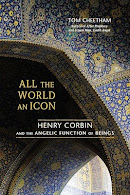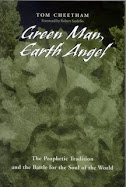"...the Imagination (or love, or sympathy, or any other sentiment) induces knowledge, and knowledge of an 'object' which is proper to it..."
Henry Corbin (1903-1978) was a scholar, philosopher and theologian. He was a champion of the transformative power of the Imagination and of the transcendent reality of the individual in a world threatened by totalitarianisms of all kinds. One of the 20th century’s most prolific scholars of Islamic mysticism, Corbin was Professor of Islam & Islamic Philosophy at the Sorbonne in Paris and at the University of Teheran. He was a major figure at the Eranos Conferences in Switzerland. He introduced the concept of the mundus imaginalis into contemporary thought. His work has provided a foundation for archetypal psychology as developed by James Hillman and influenced countless poets and artists worldwide. But Corbin’s central project was to provide a framework for understanding the unity of the religions of the Book: Judaism, Christianity and Islam. His great work Alone with the Alone: Creative Imagination in the Sufism of Ibn ‘Arabi is a classic initiatory text of visionary spirituality that transcends the tragic divisions among the three great monotheisms. Corbin’s life was devoted to the struggle to free the religious imagination from fundamentalisms of every kind. His work marks a watershed in our understanding of the religions of the West and makes a profound contribution to the study of the place of the imagination in human life.Search The Legacy of Henry Corbin: Over 800 Posts
Monday, June 12, 2017
New Journal of Interest

Evolutionary Studies in Imaginative Culture publishes scholarly and scientific articles and reviews on every aspect of imaginative culture: literature, film, theater, television, music, religion, the visual arts, video games, and other media. Works of imaginative culture would include both canonical and popular forms of literature, art, and other media, comics, fads and fashions, hobby groups, sports cultures, creative non-fiction, and the imaginative manifestations of politics, ethnicity, ideology, religion, and other forms of group identity. Articles are written in English, but subject matter can include works from any language and any historical period.
The central qualification for contributing to the journal is to regard works of imaginative culture as arising out of human nature—the evolved and adapted character of the human mind. While sharing a common concern with locating cultural products in human nature, contributors can focus on divergent or multiple features of cultural artifacts: their depicted content, emotional qualities, or structural and stylistic features; aesthetic and intellectual traditions; the responses of readers or viewers; the motives and character of authors or other artists; the ecological and sociopolitical context within which imaginative works are produced; or the psychological or social functions the works fulfill.
The central qualification for contributing to the journal is to regard works of imaginative culture as arising out of human nature—the evolved and adapted character of the human mind. While sharing a common concern with locating cultural products in human nature, contributors can focus on divergent or multiple features of cultural artifacts: their depicted content, emotional qualities, or structural and stylistic features; aesthetic and intellectual traditions; the responses of readers or viewers; the motives and character of authors or other artists; the ecological and sociopolitical context within which imaginative works are produced; or the psychological or social functions the works fulfill.
The journal is open to theoretical essays, interpretations of individual works or groups of works, and empirical, quantitative studies of imaginative cultural products.
Books under review can include contributions to fields such as literary Darwinism, evolutionary aesthetics, cognitive rhetoric, cognitive media studies, neuroaesthetics, and evolutionary studies of religion, society, and politics. Reviewers commenting on books in the evolutionary social sciences would typically consider the way the subjects of those books have a bearing on imaginative culture.
Subscribe to:
Posts (Atom)





